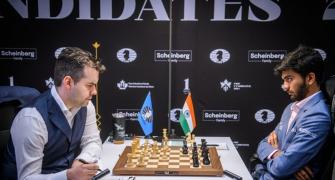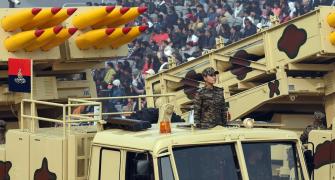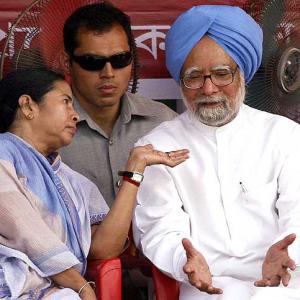The Jamia Teachers' Solidarity Association has expressed strong reservations about the proposed amendments to the Unlawful Activities Prevention Act.
According to a press statement released by the organisation, the government's nod to the amendments was "surprising at a time when evidence is surfacing about the extensive abuse of anti-terror laws in targeting minorities, tribals and political activists" under the guise of such anti-terror laws.
The proposed amendments will make the law even more draconian and amenable to human rights violations, fear rights activists.
The organisation points out that the "amendments to the Unlawful Activities Prevention Act 1967 were passed in December 2008 without any thoroughgoing debate in Parliament the aftermath of the 26/11 attack. The Bill was not referred to any Parliamentary committee despite calls by several members of Parliament for further scrutiny and consultations".
Rights activists claim that the amended UAPA inculcates many provisions of controversial anti-terror legislation like TADA and POTA, which were eventually after rampant abuse of the powers granted by them.
According to rights activist Manisha Sethi, there is no evidence to prove that tough anti-terror laws lead to a reduction in terror attacks. Even when TADA and POTA were in force, the rate of conviction of those accused of terror crimes was ridiculously low.
Critics pointed out that the "purpose of the law was not to secure convictions but to ensure that people accused of being terrorists were detained for as long as possible". Such laws only result in alienating certain sections of the community and breeding mistrust towards its members, argue rights activists.
Here are excerpts from the press statement pointing out the draconian nature of the amendments -- issued by the Jamia Teachers' Solidarity Association:
"Amendment to Section 2
The term 'person' is defined far too broadly, especially as 'an association of persons or a body of individuals, whether incorporated or not' and is thus open to misuse.
This sub clause will actually allow agencies and government to create persons 'beyond that what are recognized by law. Any group of friends/acquaintances can be labelled an 'association of persons or a body of individuals' by the agencies and government even though they may not recognise themselves as an organisation.
From a book reading club to friends who meet every evening at a dhaba may be deemed to be an association of persons or a body of individuals. This sub clause has the potential to draw in -- through guilt by association -- a wide circle of people with an accused/ suspect and accuse them of terrorist acts.
Amendment to Section 6:
This extends the ban on an organisation from the earlier specified period of two years to five years.
This amendment is very pernicious on two counts:
a) It militates against the letter and spirit of the Constitution:
Criminalising membership of associations erodes the Fundamental Rights conferred under Articles 19 (1) (c), 19 (1) (a) and 21 of the Constitution.
However, any limitation on this fundamental right to associate should be in consonance with public interest, but at all times be narrowly interpreted o as to cause least infringement of the fundamental right. Therefore a law which imposes such a heavy restriction on the exercise of fundamental rights such as this one must be read strictly.
The proposed amendment, on the contrary, by increasing the period of ban, reads the law very broadly and goes against the nature and spirit of the Indian Constitution.
It should be recalled that in the debates in December 1967, the Joint Parliamentary Committee (and not simply a select committee) lowered the banning period from three to two years, recognisng that it's a drastic restriction on fundamental rights. Indeed, no other than Atal Bihari Vajpayee called the act a donkey that had been made to look like a horse.
It will lead to gross human rights violations: Extensions of bans on organisations are justified by arguing that the organisation is continuing to function, and that its members are active. In effect, bans are upheld through continuing arrests of alleged members of the banned organisation. However, membership is notoriously difficult to prove.
During the past decade of the ban on SIMI, only one case of membership has been
proved. Extending the period of ban will further provide a license to police and investigating agencies to arrest and accuse people of being members of a banned organisation.
Amendment to Section 15:
This amendment seeks to expand terrorist act to include 'economic act'.
The amendment criminalises the production, distribution of 'high quality counterfeit currency' which the proposed explanation to the section qualifies as that counterfeit currency that imitates some of the high security features of the currency (specified in the proposed 3rd schedule).
This clause is repetitive of things that are already covered by the IPC. The equivalent sections in the IPC are already present in 489B, 489C, 489D.
Experience has shown that when comparable provisions in IPC and terror laws are available for same crimes, the police and agencies exercise the option of booking an accused under the terror law because it affords them greater leverage. This is so because in terror laws, bail provisions are much more stringent and the accused can be kept in custody for long periods (up to 180 days) without the filing of a chargesheet.
The proposed amendment to include economic offences under terrorist act, would make the offence punishable with a minimum of 5 years, extendable up to life. This is a wholesale recipe for its misuse.
Substitution of new section for section 17:
This amendment criminalises the raising of funds "from a legitimate or illegitimate source knowing that such funds are likely to be used by a terrorist organisation" "notwithstanding whether such funds were actually used or not used" for the commission of a terrorist act, shall be punishable for a term not less than five years but extendable to life.
It will practically bring under the possibility of prosecution all transactions, even perfectly legitimate ones, even without any remote connection to a terrorist act. All that the prosecution needs to show is that the accused had knowledge that such funds could be likely used for terrorist act. While such subjective knowledge may again be difficult to prove, it will no doubt result in the incarceration of accused for long periods without bail.
Remittances that workers send home from abroad, money raised by NGOs and social movements can all be easily lumped under this. The sheer magnitude of its potential abuse is mind-boggling.
No Safeguards:
The UAPA, as it stood amended in 2004, while borrowing many of the features of TADA and POTA, renounced the safeguards -- however weak -- inherent in POTA. Section 58 of POTA related to punishment and compensation for malicious action was excluded from UAPA raising fears that the government had provided police with immunity.
There is ample documentation now to show how police books cases under UAPA with little or no basis, and it is only years later when the trials end in acquittal that these men are proved innocent. The broadening of the very definition of person and association, the extension of ban period as well as the expansion of terror acts to include economic offences will only place sweeping powers in the hands of the police and agencies and further aggravate its misuse. The complete lack of any safeguards is frightening.
Responding to the absence of safeguards and the possibility of its misuse by police to harass innocent individuals, the home ministry had this to say: Now, there can be one question that there may be some members of a association, group or a company who were not associated with that decision to keep terrorist funds or with the decision of financing terrorism.
It is possible, but there is also a provision here that where any person, any member of a firm or any member of a company is not associated with it, he can produce evidence for that purpose to show that he is not associated with that. That is the safeguard. He can produce evidence to show that he is not associated.
This is not a safeguard at all! Indeed, it shifts the burden of proving one's innocence on the accused and overturns the foundational principle of natural justice that one must be considered innocent until proven guilty. The prosecution now only has to accuse someone of being a member of what it deems to be an unlawful association and it will fall upon the accused to disprove the charge.
Amendments at the behest of Financial Action Task Force:
Is it not amazing that while India seems oblivious to fulfilling its commitments to international human rights conventions such as the United Nations Convention against Torture, it seems in a great rush to push through draconian laws at the dictation of International Organisations such as the FATF?
FATF was formed to preserve the banking system and financial institutions of the First World at the initiative of the G-7. It has, since its founding in 1989, forced several member countries to make laws compliant to its own interests and has blacklisted countries, in violation of international law, which have failed to heed to its demands.
According to the home ministry note, the amendment to broaden the definition of terrorism to include economic offences is clearly driven by the imperative to comply with the FATF requirements.
Rights groups further point out that counterterrorism measures should not facilitate, or have the potential, for state terrorism. The amended UAPA will strengthen an already suspicious state, where anyone and everyone can be booked for terrorist acts, so broad are its definitions and sweeping its scope. Draconian measures have not and will not reduce terrorism, howsoever defined and understood.
Certainly, Sushil Kumar Shinde has tried to reassure the Lok Sabha that the law will not be misused. Similar reassurances in the past from the then home minister P Chidamabaram could not arrest the tidal wave of false accusations and frame-ups in terror cases that have been reported from across the country. In delivering justice, laws cannot rest on assurances".








